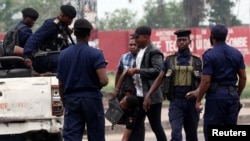Police in Congo used tear gas and gunfire to disperse thousands of anti-government demonstrators across the nation on Sunday, leaving five people dead and injuring more than 33 who marched after church services calling for President Joseph Kabila to step down, the United Nations said.
Catholic churches and activists had called for peaceful demonstrations Sunday in Kinshasa, Goma, Lubumbashi and other cities. The protests turned violent as police tried to disperse the demonstrators.
Security forces arrested 69 people countrywide, said U.N. spokeswoman in Congo Florence Marchal. The five dead were in Kinshasa, though it was unclear if police were among any of the casualties, she said. The government cut off SMS and internet services Sunday across the country to discourage gatherings.
In Congo's eastern Beni, police arrested about a dozen members of a civic organization, LUCHA, which in English is known as Fight for Change. Protesters there were also injured by stones being thrown when the demonstration turned more violent.
"We are asking President Joseph Kabila to give up power and to respect the New Year's agreement," said Vyanney Kasondwa, a LUCHA member.
The violence prompted Pope Francis to appeal for peace in Congo. Francis made the appeal Sunday from the Peruvian capital, where he led thousands of young people in prayer.
He said of Congo: "I ask the authorities and those responsible and all those in this beloved country that they use maximum commitment and effort to avoid all forms of violence and look for solutions in favor of the common good."
In a similar protest on Dec. 31 police killed at least seven people after the Saint-Sylvestre Accord was signed to set a new election date, free political prisoners and ease tensions in this vast, mineral-rich Central African country.
The United States and others have condemned Congolese security forces' response to the protests at more than 160 churches, which included tear gas being fired in churches and the altar boys being arrested.
On Jan. 12, police in the capital fired into the air and used tear gas to disperse people, including ambassadors, attending a mass at Kinshasa's Catholic cathedral to honor protesters killed in clashes with security forces.
Kabila, whose mandate ended in December 2016, had agreed to hold an election by the end of 2017. But Congo's election commission later said the vote cannot be held until December 2018.
Critics accuse Kabila of postponing elections to maintain his grip on power, while international observers have warned that Congo's political tensions could further destabilize the impoverished country and the region at large.
Kabila can remain in power until the next election is held, although he is barred by the Constitution from seeking another term in office.




